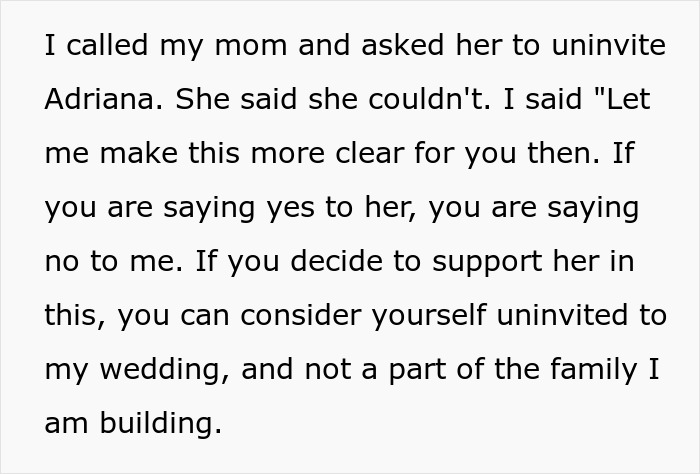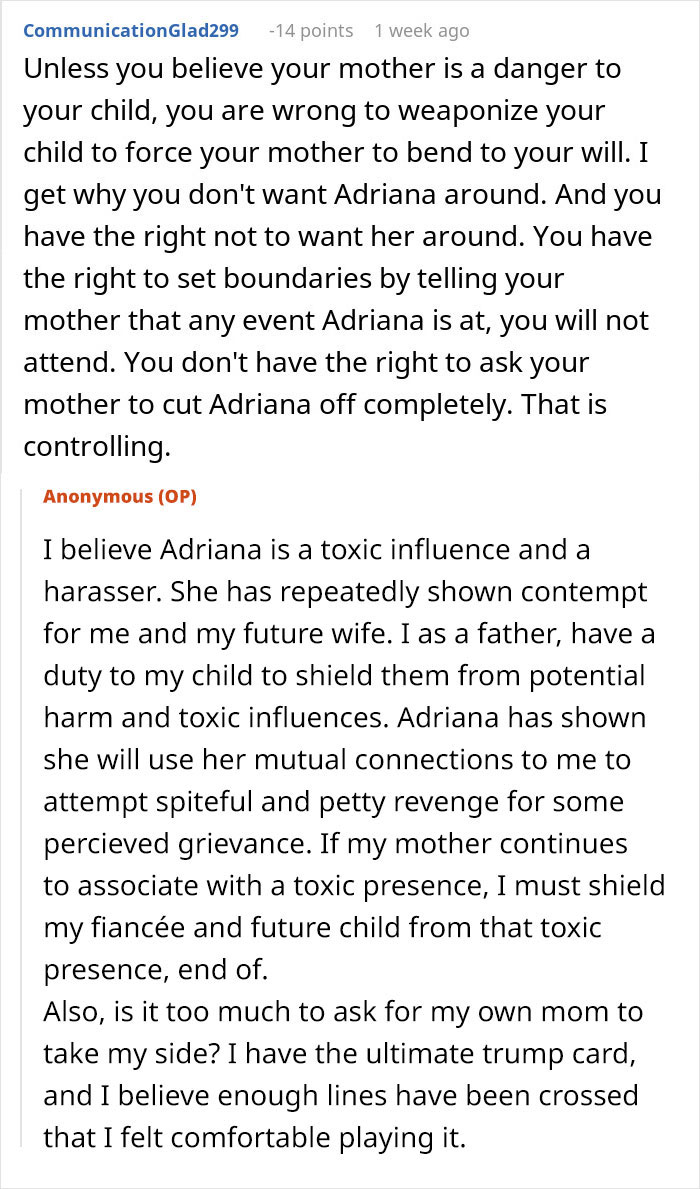Breakups after a long relationship are often so messy and unpleasant that some couples just stay together long past the time they really should have split. Normally, you’d rely on friends and family to help you get through this, but what if someone close to you just kept hanging out with your ex?
A man asked the internet if he was wrong for threatening to uninvite his mom from his wedding when she kept refusing to cut off his ex-girlfriend who was making his life hell. He later gave some examples of this in the comments and readers shared their thoughts and suggestions on how to handle these sorts of boundaries.
Most folks would expect the support of their family during a breakup

Image credits: Candice Picard / Unsplash (not the actual photo)
But one man had to give his mother an ultimatum when she insisted on inviting his ex places





Image credits: Febe Vanermen / Unsplash (not the actual photo)




Image credits: Kajetan Sumila / Unsplash (not the actual photo)




Image credits: Julia M Cameron / Pexels (not the actual photo)




Image credits: anonymous

Image credits: Kindel Media / Pexels (not the actual photo)
Creating and enforcing boundaries with parents is not easy
As you approach adulthood, it can feel like the connection you share with your parents is suddenly shifting under your feet. You adore them, but you realize that some requests, expectations, or conversations no longer apply to the person you’ve become. Establishing new boundaries, around your time, your decisions, your privacy, can feel awkward or even treacherous. And when your parents refuse to change, having a fight back with guilt trips or what-abouts regarding how they “raised you,” tension builds.
Begin by becoming clear to yourself regarding exactly what you need: perhaps it’s control over your finances, autonomy to choose your own partner, or the power to turn down guests when your schedule is full. Avoid jumping into a fight before taking time to sort out, even jotting down some notes about specific events that have left you feeling agitated. This enables you to speak from a place of clarity rather than frustration.
When you are ready, choose a calm time to share your feelings. You might say, “I enjoy spending time with you guys, and I’d like our relationship to remain healthy, but sometimes when you ask where I’m going or call me unexpectedly, I get overwhelmed.” Stating what you feel and relating it to certain behaviors lets parents know this is not an attack but an attempt at harmony.

Image credits: Andrea Piacquadio / Pexels (not the actual photo)
It’s important to be consistent
Eventually, either of them will bristle, reminding you of sacrifices they’ve made or your childhood reliance. Listen patiently, acknowledging their love and good intentions: “I know you’re anxious because you care about me. I value all that you have done.” And then tactfully reassert your own needs: “Now, I need to manage my own schedule, and advance notice gives me the mental space to enjoy our calls.” Consistency is everything. If you’ve committed to three surprise calls per week, then politely decline or deflect the fourth one by saying, “I’m working now; can we speak tonight?” If they enter your space or property, politely remind them to knock first: “I’d appreciate it if you knocked before coming into my room or using my things.” Reasserting these boundaries over time, without anger or apology, teaches your parents how to treat you now that you’re a grownup.”.
There can be backsliding: a guilt-trip threatening parent, “After everything I’ve done, you won’t even let me visit?” At that moment, don’t feel the need to explain or argue. Simply affirm your boundary: “I love having you visit, but I need us to book them in advance so I can work them in.” Then shift the conversation or hang up politely if they persist. There will be days when you’ll be uneasy, and you’ll be fearful of hurting them. But love is accommodating. If you hold firm, yet remain not unfriendly and ungrateful, you give your parents the gift of an adult relationship based on respect. They may eventually complain less and realize that your lines are not fences, but carefully crafted doorways through which your relationship can still grow.
Many thought he was being reasonable




























Some thought Adriana had some points
















